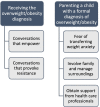Parents' experiences following conversations about their young child's weight in the primary health care setting: a study within the STOP project
- PMID: 35962359
- PMCID: PMC9375316
- DOI: 10.1186/s12889-022-13803-8
Parents' experiences following conversations about their young child's weight in the primary health care setting: a study within the STOP project
Abstract
Background: In primary healthcare, conversations between clinicians and parents about young children's overweight are key to providing support and initiating weight management. However, given the sensitivity of this topic, these conversations are difficult for both clinicians and parents and are sometimes delayed or avoided. To understand the emotional impact of these conversations, this study aims to shed light on parents' experiences following conversations with primary care nurses about their child's overweight.
Methods: Participants were recruited through a childhood obesity randomized controlled trial (RCT) conducted in Sweden. Telephone-based semi-structured interviews were conducted with 17 parents (mean age 40; the majority were women (n = 12/17), had a university degree (n = 14/17) and were born in Sweden (n = 13/16)). Their children were between 3 and 7 years old (mean age 4.8 years) with overweight (n = 7) or obesity (n = 10). The interviews were recorded, transcribed, and analyzed using thematic analysis.
Results: Two main themes were developed. Theme 1, 'Receiving the overweight/obesity diagnosis', explores parents' reactions to the conversation with the primary care nurse. Depending on how the nurse presented the topic, conversations either fostered an alliance between the parent and the nurse, encouraging parents to reflect and develop insights about the child's and the family's needs (subtheme Conversations that empower), or felt limited, uncomfortable, or belittling (subtheme Conversations that provoke resistance). Theme 2, 'Parenting a child with a formal diagnosis of obesity', explores challenges parents faced following the weight conversations, including managing their own feelings and concerns (subtheme Fear of transferring weight anxiety), dealing with others' reactions (subtheme Involve family and manage surroundings) and asking for and receiving support from health care professionals (subtheme Obtain support from health care professionals).
Conclusions: While conversations with primary care nurses about children's weight were often emotional, most parents felt these conversations were ultimately helpful, as they encouraged them to enact positive lifestyle changes. Importantly, when nurses initiated conversations in a responsive, non-blaming way, inviting parents to reflect on their situation, parents felt more supported and empowered. These findings convey the importance of providing communication skills training to pediatric healthcare professionals, with particular focus on childhood overweight and obesity.
Trial registration number: ClinicalTrials.gov NCT03800823 ; 11 Jan 2019.
Keywords: Child; Health care communication; Interviews; Obesity; Overweight; Parent; Pediatrics; Primary health care; Qualitative research; Weight perception.
© 2022. The Author(s).
Conflict of interest statement
The authors declare that they have no competing interests.
Similar articles
-
Parent and carer experiences of health care professionals' communications about a child's higher weight: a qualitative systematic review.JBI Evid Synth. 2025 Apr 1;23(4):576-637. doi: 10.11124/JBIES-24-00056. Epub 2025 Apr 7. JBI Evid Synth. 2025. PMID: 39844510 Free PMC article.
-
Planting a seed - child health care nurses' perceptions of speaking to parents about overweight and obesity: a qualitative study within the STOP project.BMC Public Health. 2019 Nov 9;19(1):1494. doi: 10.1186/s12889-019-7852-4. BMC Public Health. 2019. PMID: 31706318 Free PMC article.
-
"A balancing act": parents' longitudinal perspectives of weight-related discussions with their children following obesity treatment.BMC Public Health. 2024 Jun 25;24(1):1695. doi: 10.1186/s12889-024-19195-1. BMC Public Health. 2024. PMID: 38918803 Free PMC article. Clinical Trial.
-
Australian parents' experiences when discussing their child's overweight and obesity with the Maternal and Child Health nurse: A qualitative study.J Clin Nurs. 2019 Oct;28(19-20):3610-3617. doi: 10.1111/jocn.14956. Epub 2019 Jun 20. J Clin Nurs. 2019. PMID: 31162886
-
Communication of children's weight status: what is effective and what are the children's and parents' experiences and preferences? A mixed methods systematic review.BMC Public Health. 2020 Apr 28;20(1):574. doi: 10.1186/s12889-020-08682-w. BMC Public Health. 2020. PMID: 32345274 Free PMC article.
Cited by
-
An emotionally loaded subject - parents experiences when CHC-nurses introduce a conversation related to their child being overweight.BMC Public Health. 2024 Nov 20;24(1):3229. doi: 10.1186/s12889-024-20696-2. BMC Public Health. 2024. PMID: 39567928 Free PMC article.
-
Effects of school nurse-led health education to reduce malnutrition among primary school children in Bangladesh: Cluster nonrandomized controlled trial.J Family Med Prim Care. 2024 Mar;13(3):1024-1036. doi: 10.4103/jfmpc.jfmpc_1560_23. Epub 2024 Apr 4. J Family Med Prim Care. 2024. PMID: 38736776 Free PMC article.
-
Interventions to prevent obesity in children aged 5 to 11 years old.Cochrane Database Syst Rev. 2024 May 20;5(5):CD015328. doi: 10.1002/14651858.CD015328.pub2. Cochrane Database Syst Rev. 2024. PMID: 38763517 Free PMC article.
-
Parental Feeding Practices, Weight Perception, and Children's Appetitive Traits Are Associated with Weight Trajectories in Preschoolers: A Longitudinal Study in China.Nutrients. 2024 Oct 31;16(21):3746. doi: 10.3390/nu16213746. Nutrients. 2024. PMID: 39519578 Free PMC article.
-
Parent and carer experiences of health care professionals' communications about a child's higher weight: a qualitative systematic review.JBI Evid Synth. 2025 Apr 1;23(4):576-637. doi: 10.11124/JBIES-24-00056. Epub 2025 Apr 7. JBI Evid Synth. 2025. PMID: 39844510 Free PMC article.
References
-
- World Health Organization. Overweight and obesity fact sheets. https://www.who.int/news-room/fact-sheets/detail/obesity-and-overweight. Accessed 23 Jan 2022.
-
- NHS Digital. Part 4: Childhood overweight and obesity. https://digital.nhs.uk/data-and-information/publications/statistical/sta.... Accessed 10 June 2022.
-
- Spong EM, J. Nylander, C. High levels of overweight and obesity in four year olds in Sweden. Lakartidningen. 2021;118(21107). - PubMed
Publication types
MeSH terms
Associated data
LinkOut - more resources
Full Text Sources
Medical


